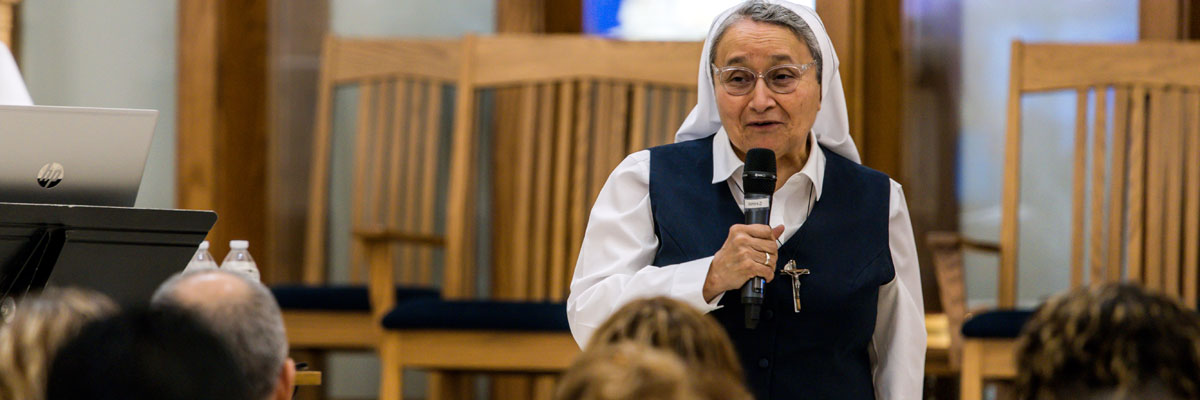Official Website of the
Catholic Diocese of Little Rock
Epiphany of the Lord 2015
Published: January 4, 2015
Bishop Anthony B. Taylor preached the following homily at Our Lady of Good Hope Church in Hope and during the Women's Religious Discernment Retreat at St. John Catholic Center in Little Rock, both on Sun. Jan. 4, 2015.
Download MP3 file to your device

Bishop Taylor
One of the questions that the Church had to answer early on was whether we were to be a new religion or not. Jesus says he was sent to the "lost sheep of the house of Israel" meaning the people on the margins, rather than to upright, respectable religious people. He didn't come to found yet another movement within Judaism to compete with his fellow Pharisees or their rival Sadducees, but since he did spend 99 percent of his time speaking to thoroughly Jewish audiences, many of the earliest Christians thought of Christianity as merely a version of Judaism — Messianic Judaism, for instance.
So if gentiles wanted to convert, they had to become Jews first — the men had to get circumcised — in order to become Christians. Soon that changed and it was determined by the Council of Jerusalem in the Acts of the Apostles that gentiles could stay gentiles even after conversion — no circumcision. We were to be a new religion, not just a version of Judaism, and anyone could belong just as they were. It was at that point that people began to understand the deeper meaning of today's feast of the Epiphany.
Though Jesus focused on the people on the margins, the lost sheep of the house of Israel, and these were practically all Jews because that was where he exercised his public ministry, from the beginning of his life there already were powerful signs pointing to the larger, universal dimension of his mission. A star rose in the sky, signaling the birth of the newborn king of the Jews. But look who comes to worship: non-Jewish Wise Men from the East, people not of his nation or religion.
Then they present him gifts symbolic of who their Savior is and what he has come to do: gold for a king, frankincense to worship him as God, and myrrh for his burial following his sacrificial death for our salvation.
They overcame serious obstacles in their search: wicked King Herod, a difficult desert journey, uncertainty about the route to take. But they followed their star and it led them to their Savior (even though they weren't Jews). Then they present him gifts symbolic of who their Savior is and what he has come to do: gold for a king, frankincense to worship him as God, and myrrh for his burial following his sacrificial death for our salvation. That is why we call this the feast of the Epiphany — the manifestation — of the Lord. Jesus manifest as the universal Savior, not merely the Savior of a small minority within a single nation.
The word "catholic" means "universal" and so this feast also means that like Jesus who seeks the well-being and salvation of all, especially the "lost sheep" on the margins of society — and as we see with the Magi, also those not of his religion or nationality — so also we should seek the well-being and salvation of all, especially the "lost sheep" on the margins of society in our own time, even those who are very different from us. The Magi never converted in any formal sense and they returned to their home country and former way of life. But God did touch their hearts and gave them an important role in his plan of salvation.
Today you and I are invited to consider what role God has chosen for us in his plan. Since Jesus' mission is universal, our role will have universal implications. Often we start with the wrong question. We ask: "What do I want to do with my life?" You won't find your role in God's plan that way. There were lots of stars in the sky for the Magi to choose from, but that's not how it worked.
That's not how it worked for the early Church either, picking and choosing which of Jesus' teachings they wanted to accept. The correct question is: "What does God want me to do with my life?" What is the one star that will lead me to my Bethlehem, to my Savior, to whom I can present my whole self, my whole life to be lived exactly as he would like me to live it ... and in that way, presenting my gifts to Jesus. Not merely gold, frankincense and myrrh, but rather my whole heart, my whole mind and my whole will — those are the gifts that cost the most personally, and those are the only gifts he really wants!




